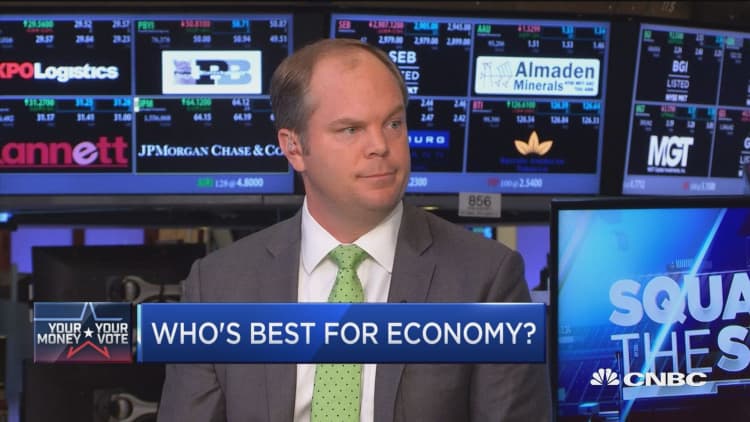
Moody's Analytics likes Hillary Clinton's economic plan much more than it did Donald Trump's.
A little more than a month after Moody's said Trump's proposals would cause a "lengthy recession," the firm took a look under the hood at the Democratic nominee's plans and said the prospects were more encouraging.
"Secretary Clinton's economic proposals will result in a somewhat stronger U.S. economy," Mark Zandi, Moody's chief economist, and two others wrote in the report. "Near-term growth is supported by the stimulus provided by her spending plans in combination with much stronger foreign immigration."
Indeed, Clinton's proposals call for $2.2 trillion in new spending over a 10-year period, with plans that would allow in about a million more immigrants a year. She's looking to boost spending on infrastructure and education, as well as providing paid family and medical leave, increasing the minimum wage, and investing in economic development and research.
To pay for her proposals, she's calling for a near-equal amount of taxation, with the burden placed primarily on the shoulders of corporations and those making more than $300,000 a year. Clinton's plans rely primarily on Keynesian demand-side solutions, while Trumps' are more focused on supply-side tax cuts.
"Evident from her proposals is the belief that the country needs to invest more in education, infrastructure and workers, and that the well-to-do, and to a lesser degree financial institutions and businesses, should pay for it," Moody's wrote. "While her budget arithmetic does not completely add up, it is pretty close, and the nation's debt load under her plan is no different than under current law."
The analysis comes as Clinton and Trump, emerging from their respective nominating conventions, are locked in a heated race for the presidency. Polls indicate Clinton is holding a narrow lead, with the most recent Real Clear Politics average putting the former first lady, New York senator and secretary of state up by 2.2 points.
Their approaches to the economy have added significance considering the current lackluster pace of growth. Gross domestic product increased by just 1.2 percent in the second quarter and 0.8 percent in the first quarter, difficult numbers on which to run for an incumbent party.
Clinton's camp did not respond to a request for comment. A Trump representative, though, lashed out again at Moody's analysis of the race.
Peter Navarro, a Trump policy advisor and economics professor at the University of California-Irvine, disputed the analysis on a number of fronts.
"In Moody's world, 'stronger foreign immigration' pushes up productivity but doesn't push down wages, the 'negative employment affect [sic]' for a higher minimum wage is 'modest,' tax hikes do not reduce the spending of higher income individuals, and her plan will result in only a 'modest increase in the federal government's budget deficits.' No reputable economist would sign on to these fantasies," Navarro said in a statement.
The winning candidate would assume stewardship of an economy where the growth rate over the past four quarters is just 1.225 percent, the third worst in a nonrecessionary period since 1956, according to Bank of America Merrill Lynch. The two previous slower four-quarter periods were in 2012 and 2013 — all during President Barack Obama's administration.
Yet Moody's points out that Clinton's proposals strongly resemble Obama's. Her taxation plans, which focus on higher earners, corporations and their overseas cash stashes and Wall Street risk-taking, mostly sound familiar. A notable exception would be her recent retreat on the Trans-Pacific Partnership, a change in heart spurred by pressure from the left and supporters of her vanquished primary opponent, Vermont Sen. Bernie Sanders.
"Secretary Clinton's tax proposals would raise substantial revenue and make the tax system meaningfully more progressive," Moody's said. "Secretary Clinton would use the additional tax revenues to pay for additional federal government spending."
Zandi came under some fire after the Trump analysis. The Moody's economist is an open Clinton supporter who has donated to her campaign.
The Trump analysis predicted the billionaire businessman's plans also would result in $11 trillion more in public debt and 3.5 million lost jobs. Trump is calling for across-the-board tax cuts that he said will spur aggressive growth, along with plans to renegotiate trade agreements and institute a sharp clampdown on illegal immigration.


